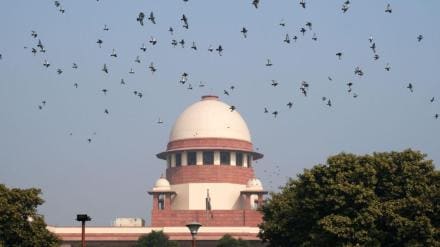The Supreme Court on Monday overturned its 1998 ruling in the PV Narasimha Rao case that granted legislators immunity from bribery charges related to their votes in Parliament and Legislative Assemblies.
A seven-judge Constitution bench headed by Chief Justice DY Chandrachud unanimously overruled the 1998 verdict delivered by a five-judge bench in the case which granted MPs and MLAs immunity from prosecution for taking bribes to make a speech or vote in the legislature.
Also Read:Bribes for Vote: Supreme Court overturns 1998 verdict – What was the case?
“While analysing the majority and minority decision of Narsimha Rao judgment, we disagree and overrule the judgment that parliamentarians can claim immunity… The judgment of the majority in Narsimha Rao which grants immunity to legislators has grave danger and thus overruled,” the court held, reported Bar and Bench.
In 1998, a 3:2 majority decision by a five-judge bench in PV Narasimha Rao v State (CBI/SPE) had established that legislators are immune from criminal prosecution for bribery concerning their speeches and votes in Parliament and Legislative Assemblies.
Also Read:Supreme Court junks Asaram’s plea to suspend sentence on medical grounds in minor’s rape case
During the present judgment, the Chief Justice remarked, “In the course of this judgment, while analyzing the majority and minority decisions of the Narsimha Rao judgment, we disagree and overrule the judgment that parliamentarians can claim immunity.”
“An individual legislator cannot claim immunity, as the claim is tethered to the collective functioning of the house,” he emphasised. “The interpretation in the Narsimha Rao judgment is contrary to Articles 105(2) and 194 of the Indian constitution,” he added.
Also Read:‘Made a mistake’: Kejriwal tells Supreme Court on retweeting ‘defamatory’ video
Article 194(2) of the Constitution stipulates, “No member of the Legislature of a State shall be liable to any proceedings in any court in respect of anything said or any vote given by him in the Legislature or any committee thereof, and no person shall be so liable in respect of the publication by or under the authority of a House of such a Legislature of any report, paper, votes, or proceedings.” Article 105(2) provides identical protections to members of Parliament.
The CJI, who read the operative part of the verdict for the bench, said that bribery is not immune under the articles as it erodes probity in public life.
Furthermore, the court clarified that an MLA accepting a bribe to vote in the Rajya Sabha election is also subject to liability under the Prevention of Corruption Act.
The verdict was issued in a case addressing whether the legal immunity provided to legislators under Articles 105(2) and 194(2) of the Constitution shields them from prosecution for accepting bribes, the bench had reserved its judgment on October 5.
The Supreme Court’s involvement in this matter stemmed from a plea filed by Sita Soren, the sister-in-law of former Jharkhand Chief Minister Hemant Soren. Notably, Hemant Soren had recently resigned after the Enforcement Directorate (ED) initiated a money laundering case against him.
Meanwhile, Sita Soren faced accusations of accepting a bribe to vote for a specific candidate in the 2012 Rajya Sabha Elections.
In 2012, a complaint was lodged with the Chief Election Commissioner of India, urging a Central Bureau of Investigation (CBI) inquiry into the case. Sita Soren was charged with criminal conspiracy and bribery under the Indian Penal Code (IPC) and with criminal misconduct by a public servant under the Prevention of Corruption Act.In 2014, the Jharkhand High Court, while hearing her plea to quash the case, observed that Soren had not cast her vote for the person who had offered her the bribe.The case reached the Supreme Court after Soren appealed against the High Court’s decision to dismiss her plea.
In 1998, a Constitution Bench of the Supreme Court, in the PV Narasimha Rao v. State case, had held that Article 105(2) also shields MPs from bribery charges. A 3:2 majority reasoned that 105(2) applies not only to voting but also to anything connected to voting, including accepting bribes that influence the voting process.
(With inputs from Bar and Bench)
